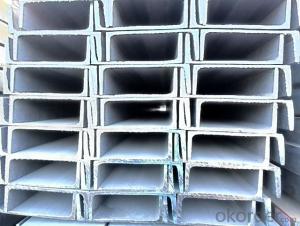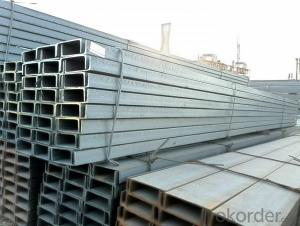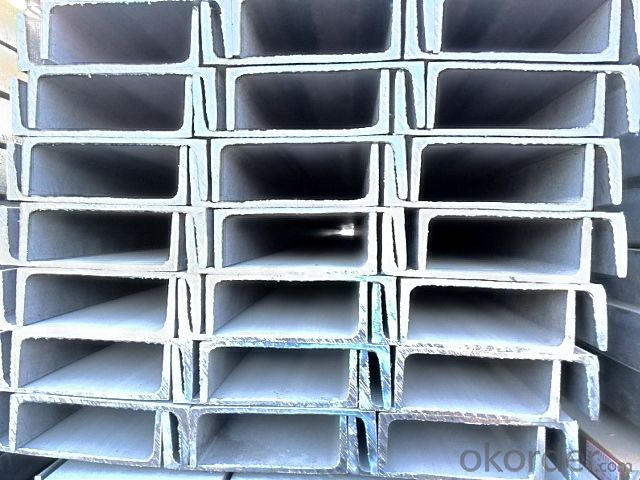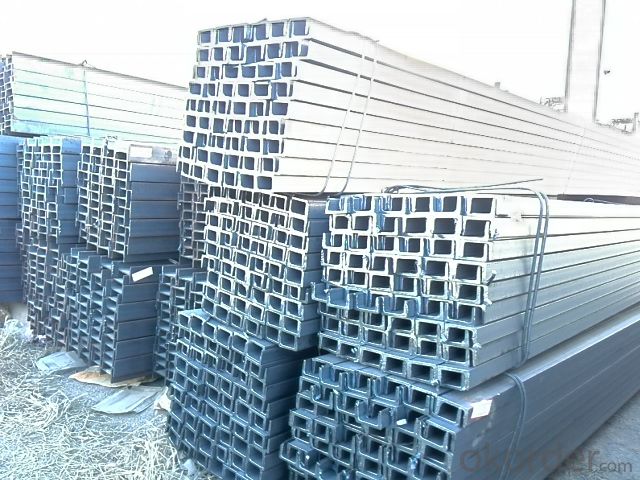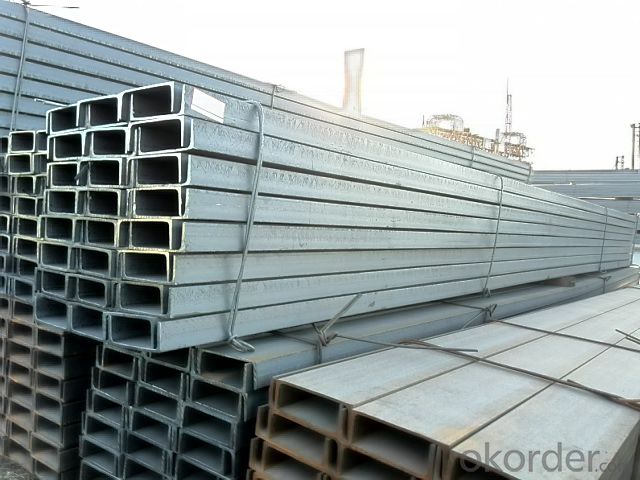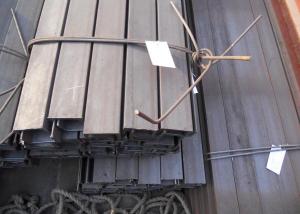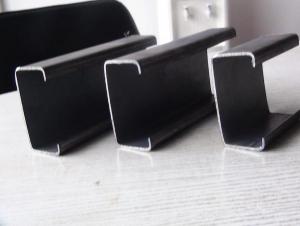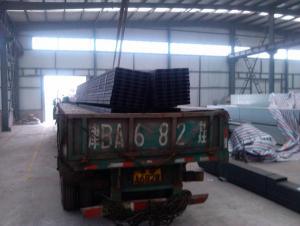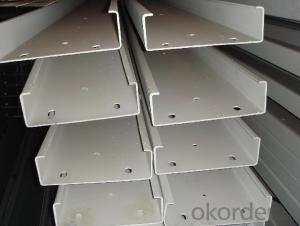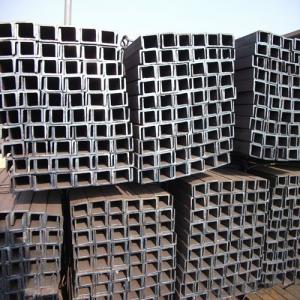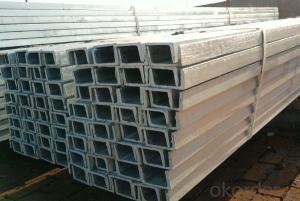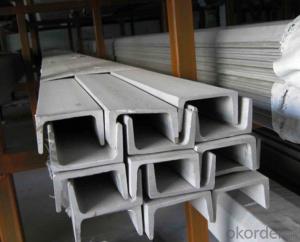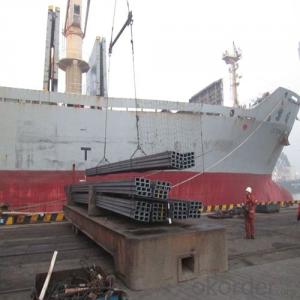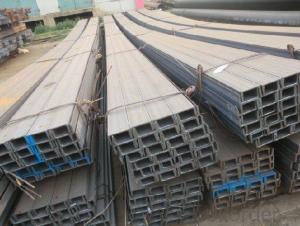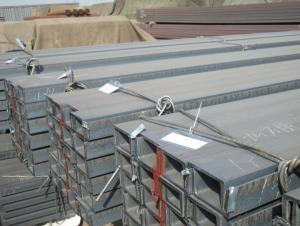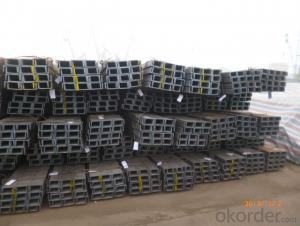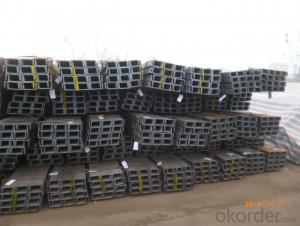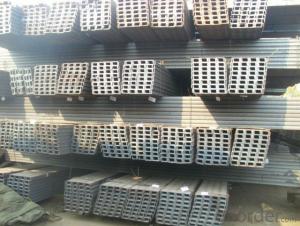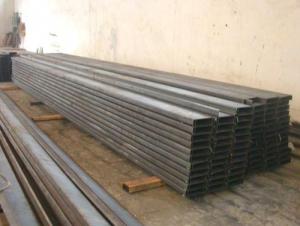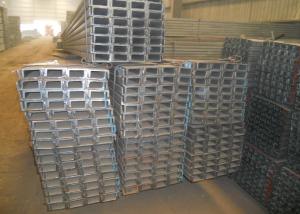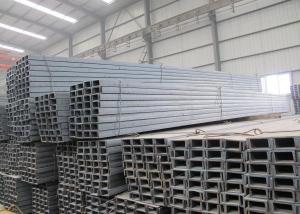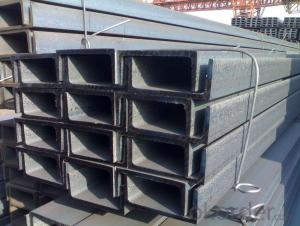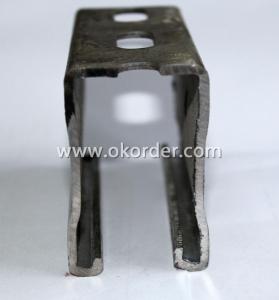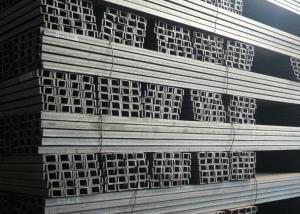Hot Rolled U-Channels with Best Price and Quality
- Loading Port:
- Tianjin
- Payment Terms:
- TT OR LC
- Min Order Qty:
- 25 m.t
- Supply Capability:
- 10000 m.t/month
OKorder Service Pledge
OKorder Financial Service
You Might Also Like
Specification
Okorder.com is a professional materials & equipment supplier & manufacturer, offers integrated one-stop services including real-time quoting and online cargo tracking. We are funded by CNBM Group, a Fortune 500 enterprise and the largest materials & equipment firm in China.
Product Applications:
The MS Channel can be applied to construction of warehouses, workshops, sport stadiums and car parks etc.The hot rolled channel steel belongs to carbon structural steel which is applied to in the field of construction and machinery.In details, the hot rolled channel steel is usually used for arch-itechtural structure, and they could be welded in order to support or hang a vari-ety of facilities. They are also usually used in combination with I beam. Generally,the hot rolled channel steel we supply must possess perfect welding property, riveting property and mechanical property and so on.
Product Advantages:
OKorder's Steel U-Channels are durable, strong, and resist corrosion.
Main Product Features:
· Premium quality
· Prompt delivery & seaworthy packing (30 days after receiving deposit)
· Corrosion resistance
· Can be recycled and reused
· Mill test certification
· Professional Service
· Competitive pricing
Product Specifications:
1.We supply high quality MS Channel at reasonable price, including Chinese standard, Japanese standard and so on.
Standard | GB/JIS |
Material Grade | Q235,SS400 |
Technique: | Hot Rolled |
Sizes as per chinese standard: | 50*37*4.5mm - 300*89*11.5mm |
Sizes as per japanese standard: | 50*25*3mm – 200*80*7.5mm |
Length: | 6meter, 9meter, 12meter |
Note: 1.we are also competent to provide our customers other MS Channel based on other sizes according to customer’s requirements.
2. The length of our ms channel could be cut into other meters as per customer’s requirements. For example, the channel in 6meters could be cut into 5.8meters in order to be fit in the 20ft container.
2. The detailed sections of MS Channel as per GB standard.are shown in the table-1:
GB U CHANNEL | Standard | Sectional | Dimension |
| Mass: |
(mm) | (mm) | (mm) | (mm) | ||
50X37 | 50 | 37 | 4.50 | 7.0 | 5.438 |
63X40 | 63 | 40 | 4.80 | 7.5 | 6.634 |
80x43 | 80 | 43 | 5.00 | 8.0 | 8.045 |
100x48 | 100 | 48 | 5.30 | 8.5 | 10.007 |
120x53 | 120 | 53 | 5.50 | 9.0 | 12.059 |
140x58 | 140 | 58 | 6.00 | 9.5 | 14.535 |
140x60 | 140 | 60 | 8.00 | 9.5 | 16.733 |
160x63 | 160 | 63 | 6.50 | 10.0 | 17.240 |
160x65 | 160 | 65 | 8.50 | 10.0 | 19.752 |
180x68 | 180 | 68 | 7.00 | 10.5 | 20.174 |
180x70 | 180 | 70 | 9.00 | 10.5 | 23.000 |
200x73 | 200 | 73 | 7.00 | 11.0 | 22.637 |
200x75 | 200 | 75 | 9.00 | 11.0 | 25.777 |
220x77 | 220 | 77 | 7.00 | 11.5 | 24.999 |
220x79 | 220 | 79 | 9.00 | 11.5 | 28.453 |
250x78 | 250 | 78 | 7.00 | 12.0 | 27.410 |
250x80 | 250 | 80 | 9.00 | 12.0 | 31.335 |
250x82 | 250 | 82 | 11.00 | 12.0 | 35.260 |
280x82 | 280 | 82 | 7.50 | 12.5 | 31.427 |
280x84 | 280 | 84 | 9.50 | 12.5 | 35.823 |
280x86 | 280 | 86 | 11.50 | 12.5 | 40.219 |
300x85 | 300 | 85 | 7.50 | 13.5 | 34.463 |
300x87 | 300 | 87 | 9.50 | 13.5 | 39.173 |
300x89 | 300 | 89 | 11.50 | 13.5 | 43.883 |
Table-1
FAQ:
Q1: Why buy Materials & Equipment from OKorder.com?
A1: All products are carefully selected from China's most reliable manufacturing enterprises. Through its ISO certifications, OKorder.com adheres to the highest standards and a commitment to supply chain safety and customer satisfaction. We can guarantee the quality!
Q2: The products are invoicing on theoretical weight or on actual weight?
A2: We can do it in both manners, it’s according to buyer's requirement.
Q3: Can you offer the third part inspection certificates ?
A3: We are able to present our customers relevant SGS test report for mechanical property of MS Channel as customer’s request.
Images:
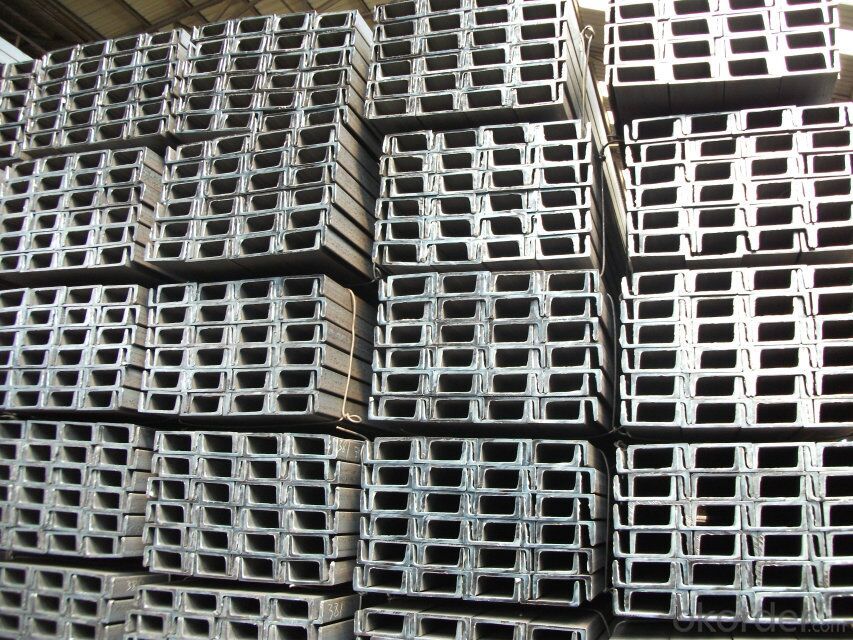
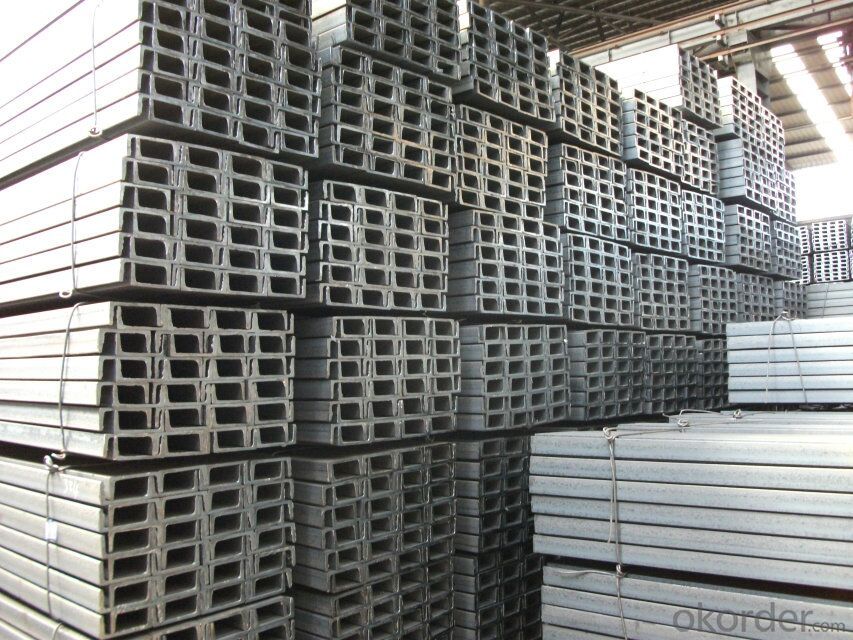
- Q: What are the different types of steel channel connections used in industrial buildings?
- Industrial buildings commonly utilize various types of steel channel connections, which serve as essential components for ensuring structural strength, stability, and load-bearing capacity. Some of the frequently employed steel channel connections in industrial buildings are as follows: 1. Bolted Connections: One of the most prevalent types of steel channel connections involves the utilization of bolts to connect the channels together. Bolted connections facilitate easy installation and can be readily disassembled or modified if necessary. These connections are renowned for their exceptional strength and reliability. 2. Welded Connections: Welding is another extensively employed method for joining steel channels in industrial buildings. This technique involves fusing the channels together using heat, resulting in a robust and permanent connection. Welded connections are esteemed for their superior strength and rigidity. They are often favored in applications that demand structural integrity and significant load-bearing capacity. 3. Riveted Connections: Riveting is a traditional approach to connecting steel channels, wherein rivets are employed to join the channels together. Riveted connections offer remarkable strength and durability. However, their installation requires specialized equipment and expertise, which renders them less common in modern industrial buildings. 4. Cleat Connections: Cleat connections find frequent usage when connecting steel channels to other structural members like beams or columns. A cleat, which can be a steel plate or angle, is bolted or welded to the channel, securely attaching it to the adjacent member. Cleat connections provide a reliable and efficient means of joining different components within an industrial building. 5. Gusset Plate Connections: Gusset plate connections are employed to connect steel channels at intersection or joint points. A gusset plate, typically made of steel, is bolted or welded to the channels, imparting additional strength and stability to the connection. These connections are commonly observed in truss systems and other load-bearing applications. It is imperative to acknowledge that the selection of a specific type of steel channel connection for an industrial building depends on various factors, such as the structural design, load requirements, and construction methods. Seeking consultation from a structural engineer or construction professional is vital to determine the most suitable connection type for a given application.
- Q: Can steel channels be used for mezzanine flooring?
- Yes, steel channels can be used for mezzanine flooring. Steel channels are often used in the construction of mezzanine floors due to their strength, durability, and load-bearing capacity. They provide a sturdy and reliable base for elevated platforms and can support heavy loads. Additionally, steel channels can be easily combined with other materials such as steel decking or plywood to create a solid flooring surface. Overall, steel channels are a popular choice for mezzanine flooring due to their structural integrity and ability to withstand heavy foot traffic and equipment.
- Q: Are steel channels suitable for indoor recreational facilities?
- Yes, steel channels are suitable for indoor recreational facilities. Steel channels are commonly used in construction for their durability, strength, and versatility. They can be used for various applications in recreational facilities such as supporting structural elements, framing, and creating partitions or barriers. Steel channels are also resistant to fire, pests, and decay, making them a reliable choice for indoor environments. Additionally, steel channels can be easily customized and installed, allowing for flexibility in design and layout. Overall, steel channels provide a stable and long-lasting solution for indoor recreational facilities.
- Q: Can steel channels be used for supporting prefabricated wall panels?
- Supporting prefabricated wall panels is possible with steel channels. Steel channels have a robust and inflexible support structure that can withstand the weight and load of the wall panels. In construction projects, they are frequently employed to provide stability and structural integrity to various building components, notably walls. Steel channels offer numerous benefits, including a high strength-to-weight ratio, durability, and versatility. They can be easily customized and fabricated to meet the precise requirements of the project. Moreover, steel channels are fire, pest, and moisture resistant, making them suitable for supporting prefabricated wall panels in a variety of buildings, such as residential, commercial, and industrial structures.
- Q: How do steel channels contribute to the overall thermal insulation of a structure?
- The overall thermal insulation of a structure is not directly influenced by steel channels. Nevertheless, these channels can have a role in supporting and securing the insulation materials used for thermal insulation. Typically, insulation materials like foam boards or fiberglass are installed between the structural framing members of a building to decrease heat transfer. As part of the structural framework, steel channels can provide the necessary support for these insulation materials. Steel channels aid in preventing any movement or displacement of the insulation materials, which could compromise their effectiveness. Moreover, they can act as a barrier, safeguarding the insulation from compression or damage during construction or over time. Additionally, steel channels have the ability to create airtight seals around the edges of insulation materials. This helps to minimize air leakage and improve the overall thermal performance of the structure. To summarize, although steel channels do not contribute directly to thermal insulation, they are crucial in supporting and securing insulation materials, ensuring their effectiveness, and enhancing the overall thermal insulation of a structure.
- Q: You design expert asked: do barrier 5 meters, how long the channel to bear?
- With 10 channel (GB) between 800 to 1000 longitudinal horizontal laying, select the 5# angle, the middle span up to 7M without support (pillar). Compares the aspect to the full use of meters. With No. 10 square tube pitch 610--810 survived, white painted with the suitable iron staircase is beautiful. The ceiling also save cost, also there are no pillars stairs is a good point. I think I've seen a picture in the post, is to use local square steel tubes do, sensory or good.
- Q: How do steel channels perform in high-temperature industrial applications?
- The excellent performance capabilities of steel channels make them widely used in high-temperature industrial applications. Their high heat resistance is one of their key advantages in such environments. Steel is a highly durable and heat-resistant material, allowing it to withstand extreme temperatures without deformation or degradation. In high-temperature industrial applications, steel channels maintain their structural integrity even when constantly exposed to elevated temperatures. They can withstand thermal expansion and contraction without warping or bending, ensuring the stability and reliability of the structures they are used in. Additionally, steel channels exhibit excellent corrosion resistance, which is crucial in high-temperature environments where chemicals and gases may be present. This corrosion resistance prevents deterioration even when exposed to aggressive substances, ensuring their longevity and minimizing maintenance requirements. Moreover, steel channels possess high strength and load-bearing capacity, making them suitable for heavy-duty applications in industries such as manufacturing, construction, and oil and gas. Their robustness enables them to support heavy loads and withstand the demands of high-temperature environments without compromising their structural integrity. Furthermore, steel channels are versatile and easily customizable to meet specific requirements. They are available in various sizes, shapes, and thicknesses, allowing for greater flexibility in designing structures for high-temperature industrial applications. This adaptability makes steel channels the preferred choice for engineers and designers working in such industries. In conclusion, steel channels excel in high-temperature industrial applications due to their heat resistance, corrosion resistance, strength, and versatility. They provide reliable and durable components for structures exposed to extreme temperatures, ensuring the necessary stability and functionality for safe and efficient operations in high-temperature environments, whether it be in furnaces, boilers, or other industrial settings.
- Q: Is channel steel expensive or angle expensive?
- There is a difference in price for different specifications
- Q: Can steel channels be used for building facades?
- Yes, steel channels can be used for building facades. Steel channels are commonly used in construction for their high strength and durability. They can be used to frame and support building facades, providing structural integrity and stability. Steel channels can be easily customized and fabricated into various shapes and sizes to meet the design requirements of the facade. Additionally, steel channels can be coated or finished to enhance their appearance and protect against corrosion, making them suitable for both functional and aesthetic purposes in building facades.
- Q: Are steel channels suitable for use in the construction of elevated storage systems?
- Yes, steel channels are suitable for use in the construction of elevated storage systems. Steel channels provide strength, durability, and stability, making them ideal for supporting heavy loads and withstanding the forces associated with elevated structures. Additionally, steel channels can be easily customized and are readily available, making them a practical choice for constructing elevated storage systems.
Send your message to us
Hot Rolled U-Channels with Best Price and Quality
- Loading Port:
- Tianjin
- Payment Terms:
- TT OR LC
- Min Order Qty:
- 25 m.t
- Supply Capability:
- 10000 m.t/month
OKorder Service Pledge
OKorder Financial Service
Similar products
Hot products
Hot Searches
Related keywords
